
According to the Hebrew Bible, the Kingdom of Israel, was one of two successor states to the former United Kingdom of Israel and Judah. Historians often refer to the Kingdom of Israel as the "Northern Kingdom" or as the "Kingdom of Samaria" to differentiate it from the Southern Kingdom of Judah.
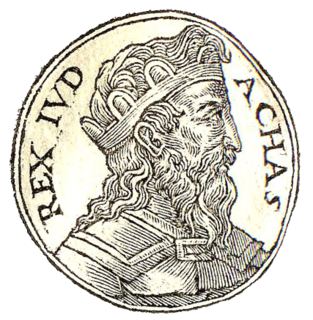
Ahaz an abbreviation of Jehoahaz II, "Yahweh has held" was the twelfth king of Judah, and the son and successor of Jotham. Ahaz was 20 when he became king of Judah and reigned for 16 years.

Tiglath-Pileser III was a prominent king of Assyria in the eighth century BCE who introduced advanced civil, military, and political systems into the Neo-Assyrian Empire.
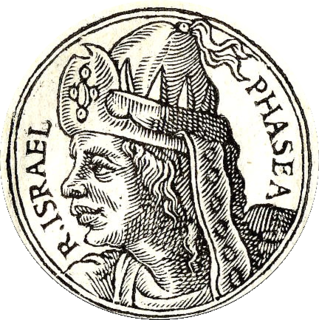
Pekah was the eighteenth and penultimate king of Israel. He was a captain in the army of king Pekahiah of Israel, whom he killed to become king. Pekah was the son of Remaliah.
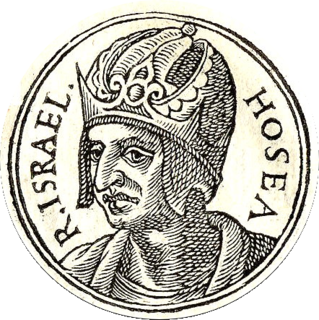
Hoshea was the nineteenth and last king of the Israelite Kingdom of Israel and son of Elah. William F. Albright dated his reign to 732–721 BC, while E. R. Thiele offered the dates 732–723 BC.
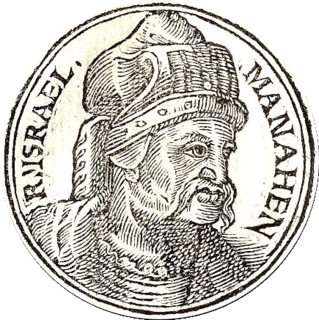
Menahem or Menachem was the sixteenth king of the northern Israelite Kingdom of Israel. He was the son of Gadi, and the founder of the dynasty known as the House of Gadi or House of Menahem. Some have speculated that Gadi was a scion of the tribe of Gad.

Pekahiah was the seventeenth and antepenultimate king of Israel and the son of Menahem, whom he succeeded, and the second and last king of Israel from the House of Gadi. He ruled from the capital of Samaria.
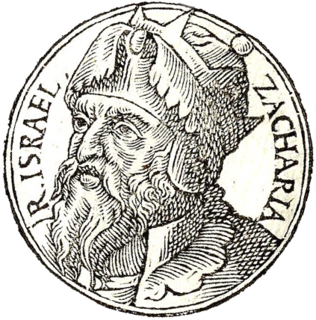
Zechariah was the fourteenth king of the northern Israelite Kingdom of Israel, and son of Jeroboam II.

Jotham or Yotam was the eleventh king of Judah, and son of King Uzziah and Jerusha, daughter of Zadok. Jotham was 25 when he began his reign, and reigned for 16 years. Edwin R. Thiele concluded that his reign commenced as a coregency with his father, which lasted for 11 years. Because his father Uzziah was afflicted with tzaraath after he went into the Temple to burn incense, Jotham became governor of the palace and the land at that time, i.e. coregent, while his father lived in a separate house as a leper.
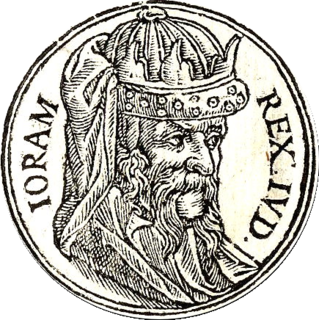
Jehoram of Judah or Joram, was the fifth king of Judah, and the son of king Jehoshaphat. Jehoram took the throne at the age of 32 and reigned for 8 years, although he was ill during his last two years.

Uzziah, also known as Azariah, was the tenth king of the ancient Kingdom of Judah, and one of Amaziah's sons. Uzziah was 16 when he became king of Judah and reigned for 52 years. The first 24 years of his reign were as co-regent with his father, Amaziah.

The Davidic line or House of David refers to the lineage of King David through the texts in the Hebrew Bible, in the New Testament, and through the succeeding centuries. It is the bloodline that the Hebrew Messiah is said to descend from according to Judaism and Christianity. The Christian gospels claim Jesus descends from the Davidic line and thus is the legitimate Hebrew Messiah. The New Testament books of Matthew and Luke give two different accounts of the genealogy of Jesus that trace back to King David.

This article is an overview of the kings of the United Kingdom of Israel as well as those of its successor states and classical period kingdoms ruled by the Hasmonean dynasty and Herodian dynasty.

Hosea 1 is the first chapter of the Book of Hosea in the Hebrew Bible or the Old Testament of the Christian Bible. This book contains the prophecies attributed to the prophet Hosea son of Beeri, and this chapter especially set forth the spiritual whoredom of Israel by symbolical acts. It is a part of the Book of the Twelve Minor Prophets.

2 Kings 16 is the sixteenth chapter of the second part of the Books of Kings in the Hebrew Bible or the Second Book of Kings in the Old Testament of the Christian Bible. The book is a compilation of various annals recording the acts of the kings of Israel and Judah by a Deuteronomic compiler in the seventh century BCE, with a supplement added in the sixth century BCE. This chapter records the events during the reign of Ahaz, the king of Judah.
The House of Baasha or Baasha dynasty was a reigning dynasty of the Kingdom of Israel. They are depicted in the first of the Books of Kings. Their estimated reign is placed in the 10th century BCE.
The House of Jehu or Jehu dynasty was a reigning dynasty of the Kingdom of Israel. They are depicted in both of the Books of Kings. Their estimated reign is placed from the 9th century to the 8th century BCE.

2 Kings 15 is the fifteenth chapter of the second part of the Books of Kings in the Hebrew Bible or the Second Book of Kings in the Old Testament of the Christian Bible. The book is a compilation of various annals recording the acts of the kings of Israel and Judah by a Deuteronomic compiler in the seventh century BCE, with a supplement added in the sixth century BCE. This chapter records the events during the reigns of Azariah (Uzziah) and his son, Jotham, the kings of Judah, as well as of Zechariah, Shallum, Menahem, Pekahiah and Pekah, the kings of Israel. Twelve first verses of the narrative belong to a major section 2 Kings 9:1–15:12 covering the period of Jehu's dynasty.















